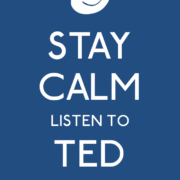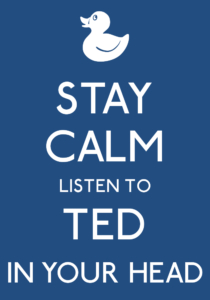Anticipatory Anxiety: How to Stop Fearing What Hasn’t Happened: Episode 444
 Anticipatory anxiety is the anxiety we experience in anticipation of doing things that frighten us. Call it the fear of being afraid. If we perceive something will be fearful for us, or if we have found that situation fearful in the past, we can become so unwilling to go through that fear again that we start making ourselves afraid or anxious even before anything’s happened. Anticipatory anxiety can shut us down and stop us cold. So, what can we do to keep anticipatory anxiety at bay? In this episode, Ted talks about how to stop creating fear and anxiety for yourself about something that has not happened. If you have driving anxiety, social anxiety or any kind of anxiety, check out this episode.
Anticipatory anxiety is the anxiety we experience in anticipation of doing things that frighten us. Call it the fear of being afraid. If we perceive something will be fearful for us, or if we have found that situation fearful in the past, we can become so unwilling to go through that fear again that we start making ourselves afraid or anxious even before anything’s happened. Anticipatory anxiety can shut us down and stop us cold. So, what can we do to keep anticipatory anxiety at bay? In this episode, Ted talks about how to stop creating fear and anxiety for yourself about something that has not happened. If you have driving anxiety, social anxiety or any kind of anxiety, check out this episode.
Listen to this podcast episode now:
I bought the house I live in in the middle of the recession in 2009. My hypnotherapy practice was very slow. A scary thought started eating its way into my mind like a parasite. It went like this: “Because of this recession, I’m going to lose my house and I just bought it.” This thought grew in intensity and fear as I continued to feed the parasite with negative scenarios, such as imagining me and my wife packing up our stuff and moving back into an apartment, feeling ashamed and embarrassed. I had been in tough financial situations in the past which had caused me a lot of anxiety and fear.
It got to the point where I found myself expecting something bad to happen. Because of the negative vibes I was sending out, my business phone stopped ringing almost completely, which made the situation even worse. I was as nervous as a snail crossing the highway. I was experiencing anticipatory anxiety which is the fear of what might happen.
One night I was lying in bed kind of freaking out, thinking about all the past pickles I’d found myself in. All of a sudden it occurred to me that I had been in situations much more dire and had managed to make it through. I’d never been homeless, always had enough to eat, and always had people willing to help me out. I realized that I had been creating frightening images in my mind that simply had not happened. I was scaring the crap out of myself. (I call this scatpooy, by the way, which stands for scaring the poop out of yourself.)
The truth was, I was not even close to losing my house. Yet, I was imagining it as if it was already happening. Because the mind cannot distinguish between what is real and what is vividly imagined, these scary scenarios were creating fear and anxiety in me. That night, I stopped focusing on what I didn’t want. I wrote some goals down, and started to focus and think about what I wanted, which was prosperity, abundance and happiness.
We think that worry will protect us. It won’t. We think that having anxiety will prepare us. It won’t. In fact, all anxiety does is shut us down.
It’s good to be concerned, and it’s wise to plan for eventualities. It’s smart to see the writing on the wall and be prepared with a contingency plan. It’s another thing entirely to create fear and worry over something that doesn’t exist or that hasn’t happened yet. To imagine something bad happening before it’s happened is not helpful.
In my work with clients, typically people who have anticipatory anxiety are already anxious about things like driving, social situations, test taking, or even being able to perform in bed. The thought that creates anticipatory anxiety is “What if…”
For example, someone who is anxious while driving might avoid driving altogether because of the thought “What if I have a panic attack while driving?” even though it may have been years since they had a panic attack. Of course, this kind of thinking makes anxiety and even a panic attack more likely to happen. It’s a vicious cycle of fear.
Someone who has social anxiety might think “What if I get self-conscious and turn red and people notice that I’m uncomfortable?”
Call it the fear of being afraid. If we perceive something will be fearful for us, or if we have found that situation fearful in the past, we can become so unwilling to go through that fear again that we start making ourselves afraid or anxious even before anything’s happened. There’s a great article on Psychology today titled “Anticipatory Anxiety: Bleeding Before You Are Cut.” It goes on to say that:
· Anticipatory anxiety is the anxiety we experience in anticipation of doing things that frighten us.
· Anticipatory anxiety is the third layer of anxiety—the avoidance aspect.
Anticipatory anxiety can shut us down and stop us cold. So, what can we do to keep anticipatory anxiety at bay?
The first thing to do is to be clear about what you want, and not focus on what you don’t want. You might say “My intention is to be calm and comfortable while driving.” Or “I want to feel calm and in control in social situations. Write it down like a goal. Start to direct your mind towards the outcome you want to see and get your mind more familiar with that. Ask yourself “How would my life be better if I can be free from this fear or anxiety?”
Second, try to see reality clearly if you can. Anticipatory anxiety can cloud your vision. Get present to what’s happening now, instead of the disaster that you think will happen. Then deal with what is in front of you. If you can do that, you’ll see that it’s probably not as bad as the horror film in your head. Get out of your head and into your body. Breathe and take some steps to calm yourself down in the moment. Are you exaggerating? Are you catastrophizing a little too much? Can you step back just a bit and say, “Well, it probably won’t be that bad?”
Next, change your language. Check what you’re saying to yourself. Does it sound something like this “Oh my god, I just know that this is going to be terrible?” If so then, stop and ask yourself: “How do I know that? Can I predict the future? How do I know that it’s going to be terrible?” Answer: you don’t. Even if it has been that way before, remember the past does not have to equal the future. Every thought is a prayer to the universe and all human creation starts in the mind. Use daily affirmations to change your pattern of self-talk. My favorite affirmation is this: “Right here, right now, everything is ok.” Practice calming yourself now as you think about the situation that’s coming up. This will help to associate calm and relaxation with the situation. It’s easier than calming yourself when you are in the middle of it.
The next step is to determine what actions you can take now to prepare, remedy, or plan for the situation that’s worrying you. Ask “How can I make this more manageable for myself?” Realize that for every problem, there is a solution. It may not be the ideal solution but try something. Doing nothing leaves you even more paralyzed and stuck with that churning feeling in your gut.
Lastly, see if you can cultivate trust and confidence in your ability to overcome fear. I can assure you of this: you have no idea how resilient you can be. Sometimes we need to be put to the test to force us to reach deep down inside for courage, resourcefulness and plain ole grit. You’ve got to tell yourself every day” I refuse to use the immense power of my imagination to create fear and anxiety for myself. I’m up for this challenge; it may not go my way but I won’t let it take me down.” Accept that some things are scary and that your mind is doing what it needs to do to keep you safe. Don’t beat yourself up for being afraid. The key is to face the fear and move through it.
We have these amazing imaginations that allow us to imagine things that don’t exist. This allows us to create first in our minds, then in reality, amazing accomplishments, dreams and desires. Or using that same amazing imagination, we can create the most frightful scenarios that leave us trembling and disempowered.
It all starts in the mind. How will you use the incredible power of your mind?
Speaking of the incredible power of your mind, if you need some help tapping into that power to overcome fear and anxiety, I invite you to reach out and request a complimentary consultation. Go to tedmoreno.com/contact, send me an email and I’ll get back to you within 48 hours. We’ll have a conversation to see if hypnotherapy and high-performance coaching is right for you and if it is, we’ll get started with your first hypnotherapy session.
In closing, let me leave you with a quote by Alfred Hitchcock:
“There is no terror in the bang, only in the anticipation of it.”
Thanks for reading this and have a great day.
Ted
Want to catch up on previous episodes? Click Here >
If you need some help tapping into your mindpower to overcome fear and anxiety, reach out and request a complimentary consultation. Go to TedMoreno.com/contact., send an email and Ted will get back to you within 48 hours. You’ll have a conversation to see if hypnotherapy and high-performance coaching is right for you and if it is, you can get started with your first hypnotherapy session



 Chronic pain and anxiety have a strong relationship to each other. Anxiety can cause or increase pain and pain can cause anxiety. This can cause a “negative feedback loop” making life increasingly unbearable for those that suffer from pain and anxiety.
Chronic pain and anxiety have a strong relationship to each other. Anxiety can cause or increase pain and pain can cause anxiety. This can cause a “negative feedback loop” making life increasingly unbearable for those that suffer from pain and anxiety.
 I’ve long realized that many people who have chronic anxiety aren’t aware that they have it. They will chalk it up to stress, or some other physical ailment. If they go to their doctor for, let’s say, digestive issues, they will be given a prescription that might be helpful but often times won’t address the root cause of the problem which is chronic anxiety, which is often diagnosed as an anxiety disorder.
I’ve long realized that many people who have chronic anxiety aren’t aware that they have it. They will chalk it up to stress, or some other physical ailment. If they go to their doctor for, let’s say, digestive issues, they will be given a prescription that might be helpful but often times won’t address the root cause of the problem which is chronic anxiety, which is often diagnosed as an anxiety disorder.
 The first time I went to a business mixer, I was so nervous about meeting other people, that after getting a drink, I went and stood in a corner next to another guy who also seemed to have the same problem. That’s where I stayed the whole night. I went home and my wife asked me how it went and I told her it didn’t. She went with me the next time and that made it a lot easier.
The first time I went to a business mixer, I was so nervous about meeting other people, that after getting a drink, I went and stood in a corner next to another guy who also seemed to have the same problem. That’s where I stayed the whole night. I went home and my wife asked me how it went and I told her it didn’t. She went with me the next time and that made it a lot easier.
 (Want to hear the podcast on this topic? Go to
(Want to hear the podcast on this topic? Go to 








